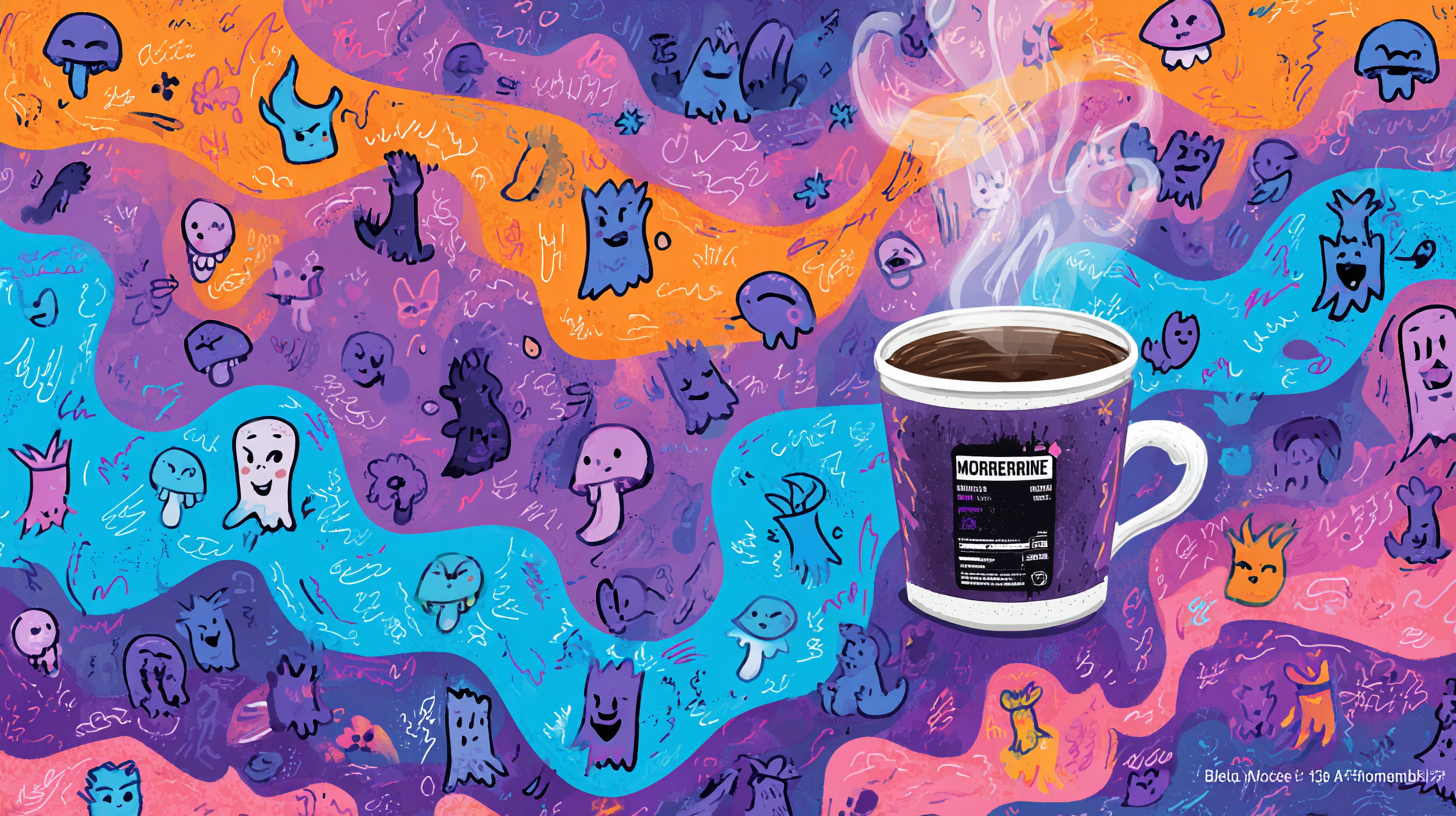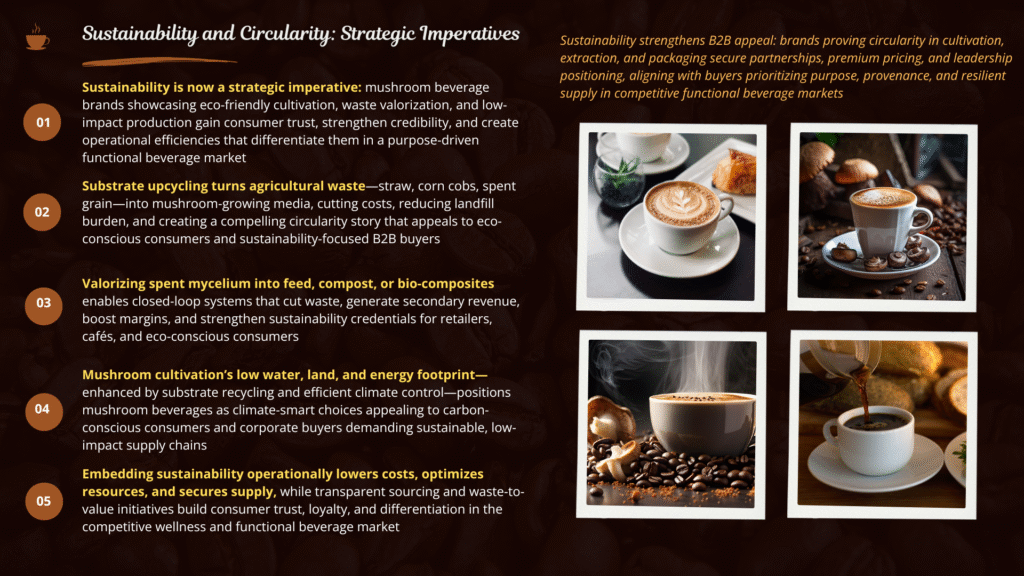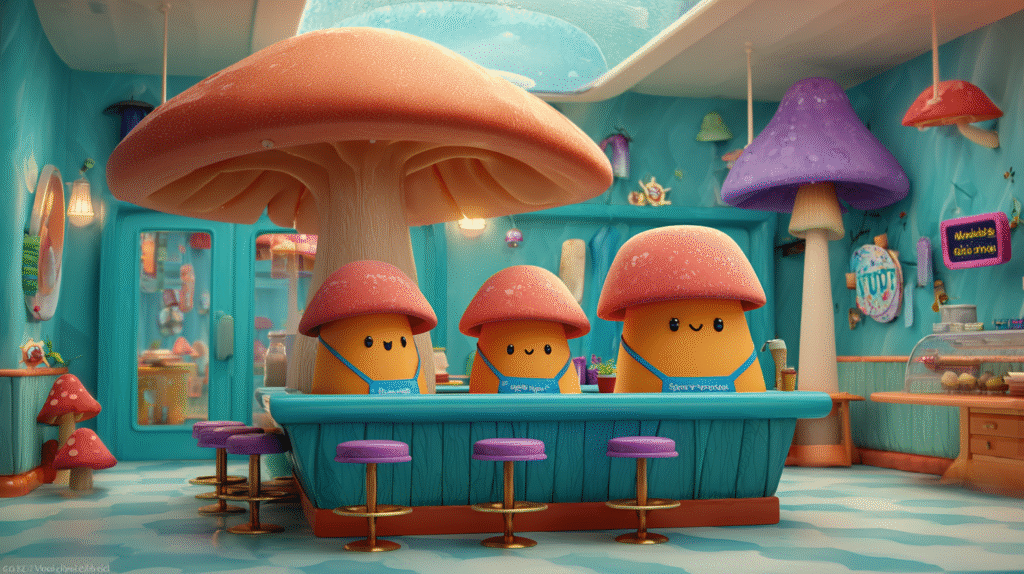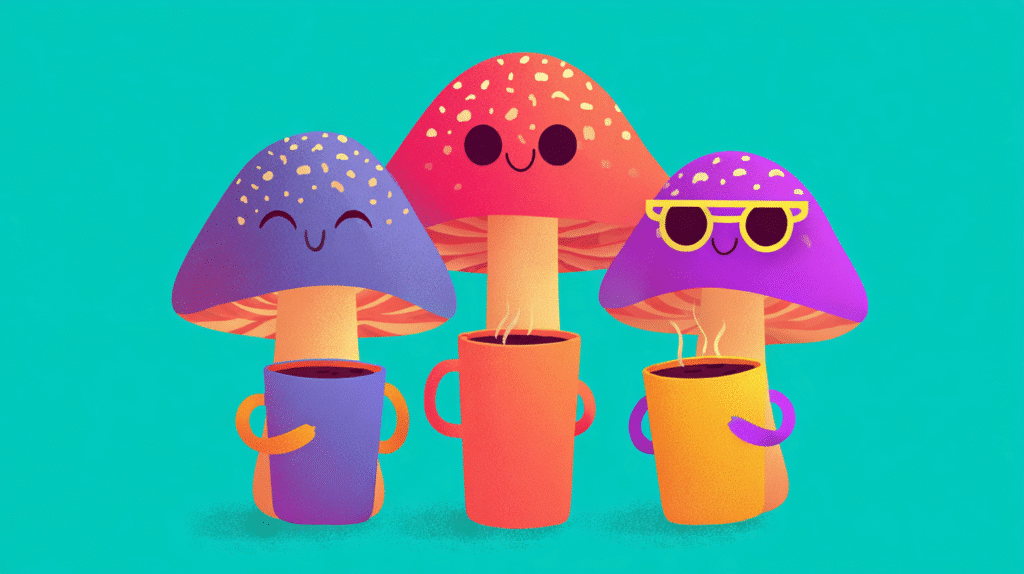Monday, 13 October 2025

Mushroom coffee and tea are redefining global beverage habits by blending daily rituals with functional wellness benefits. Driven by adaptogenic mushrooms like Lion’s Mane, Reishi, and Cordyceps, these drinks promise focus, calm, and immune resilience without caffeine crashes. The global mushroom beverage market, valued at $4 billion in 2024, is projected to reach $7.4 billion by 2034, signaling strong consumer adoption. Experts from brands like Nuvedo, Maverick & Farmer, and Hi Shroomz™ see this as the “Fourth Wave of Coffee,” where science and sustainability converge. However, success will hinge on extract quality, clinical credibility, and consumer education to distinguish genuine formulations from superficial trends.
The global morning ritual is quietly evolving. Gone are the days of coffee drinkers versus tea drinkers — now, functional hot beverages are staking their claim, with mushroom coffee and tea emerging as the rising stars. These drinks blend centuries of ethnobotanical wisdom with modern cravings for mental clarity, immune support, and a smoother, smarter caffeine experience.
So why are mushrooms finding their way into functional beverages like coffee and tea? “Mushrooms are the ultimate functional cheat code. Where botanicals need a blend of herbs to deliver multiple effects, a single mushroom like Lion’s Mane can handle brain health, gut balance, and immunity in one go”, says Jashid Hameed, Founder, Nuvedo. “They’re easier to formulate with — no bitter adaptogen aftertaste to mask — and their bioactives hit harder because our bodies recognize them; after all, we share almost half our DNA with fungi. The fact that they grow on agri-waste with a fraction of the footprint of wild-harvested botanicals, and you have a category that’s scientifically potent, scalable, and ESG gold,” he mentioned rightly.
“Mushroom coffee epitomizes coffee’s Fourth Wave: after mass-market instant, specialty chains, and artisanal origin brews, the next era emphasizes personalization, functionality, and sustainability. DXN pioneered this shift, and today’s brands scale it for wellness-conscious consumers, transforming the morning ritual into a daily health ritual.”
—- Jashid Hameed, Founder, Nuvedo
Mushroom coffee is leading the charge. Picture your daily cup — rich, aromatic, and comforting — but engineered for a steady, sustained energy boost without jitters or crashes. “Dismiss mushroom coffee as a wellness gimmick and you’d be wrong. The science is real “, mentioned Ashish D’abreo, Founder, Maverick & Farmer Coffee Roasters.” Lion’s Mane supports neurogenesis, memory, focus, and gut health. Reishi nicknamed the “mushroom of immortality”—is backed by research for immunity, stress modulation, and metabolic support. Together, these mushrooms elevate coffee into something closer to a therapeutic beverage than a caffeine hit. For consumers increasingly seeking daily rituals that double as health interventions, this is a breakthrough,” he advocated.
This is not fluff. This is strategy meeting science in a cup. In words of Oli Genn-Bash, Founder at The Fungi Consultant; Former President, UKC Psychedelics Society,” “The rise in functional mushroom beverages such as teas and coffees has been a useful way for people to experience the benefits of these fungi. Rather than just taking them in a capsule form like other supplements, consumers have the opportunity to integrate different mushrooms into their lives just like a regular tea or coffee, but with extra benefits! The main thing to look out for is the quality of the mushroom which is being used in the tea or coffee, the type of extraction method used for the mushrooms, and ensuring that there’s a decent dose per serving of tea or coffee.”
Market Scale: Niche Today, Poised for Expansion
The functional beverage market is massive, generating hundreds of billions globally, yet the hot-drink segment — spanning mushroom teas and coffees, matcha, kombucha, and adaptogens — remains a constellation of high-growth niches. Mushroom beverages are leading this charge, propelled by wellness routines and rising demand for cognitive focus, stress modulation, and immune support.
“Mushroom coffee is where the functional beverage category grows up,” Jashid argues. “It’s not just a lifestyle flex; it’s 700-plus peer-reviewed studies in a cup. Erinacines and Hericenones in Lion’s Mane promote cognitive health, Triterpenoids in Reishi help regulate stress, and Cordycepin in Cordyceps boosts energy and stamina. Unlike plant-based or fermented competitors, mushrooms deliver a suite of synergistic bioactives that go far beyond a single functional claim. Unlike matcha or kombucha, it fits into the world’s most ingrained habit — the morning coffee ritual — without asking consumers to change behavior.”

The global mushroom drinks market is projected to grow from $4.0 billion in 2024 to $7.4 billion by 2034 at a 6.4 per cent CAGR, led by mushroom coffee (49 per cent share) and powdered formats (65 per cent). Hypermarkets and supermarkets account for most sales, while North America dominates with 47 per cent of the market (~$1.8 billion).
Mushroom tea, though smaller, mirrors these growth dynamics across North America, Europe, and parts of Asia, driven by DTC subscriptions, premium grocery placement, and café integration. “Reishi for calm, Lion’s Mane for focus, Cordyceps for energy, and Turkey Tail for immunity — what once felt niche is becoming a daily ritual of renewal “, states Dr Anish Hiresha Verma, Founder & CEO, Hi Shroomz™.” Our vision is simple yet bold: to reach a million patients and families in five years, transforming recovery into resilience in a $30 billion functional foods industry ready for reinvention,” he added.
“Mushroom coffee is more than a trend—its medicinal extracts are grounded in decades of research. Yet the category remains fragile. To become coffee’s Fourth Wave, delivering daily health benefits, brands must tackle awareness, affordability, and authenticity. The science is solid; now the industry must earn consumer trust.”
— Ashish D’abreo, Founder, Maverick & Farmer Coffee Roasters
Matcha has capitalized on ceremonial heritage, antioxidant science, and premiumization trends, reaching $3.67 billion in 2025, with forecasts of $6.22 billion by 2030 at a 6.56 per cent CAGR. Regionally, the Asia Pacific held 45 per cent of 2024 value, while North America posts the fastest growth at 7.74 per cent CAGR. Kombucha, a more mature functional segment, saw the Asia Pacific market at $2.6 billion in 2023, projected to hit $4.94 billion by 2030 at a 9.6 per cent CAGR, driven by probiotic efficacy and social-lifestyle positioning.
In emerging markets, India’s mushroom drinks market grew to $121.2 million in 2024, expected to reach $214.3 million by 2030, signaling expanding wellness adoption. Mushroom drinks uniquely combine nootropic and adaptogenic effects, delivering a multi-functional profile unmatched by single-ingredient alternatives.

Taken together, the hot functional-drink ecosystem could scale into the low tens of billions within a decade, but growth depends on habit formation, not novelty. While coffee is daily and tea ritualistic, mushroom beverages remain “curiosity purchases.” Scaling will require flavor optimization, functional formulation, packaging innovation, subscriptions, and café integration. Jashid hence, leaves no doubt about the verdict: “Kombucha is a lifestyle statement, Matcha is a premium splurge, but mushroom coffee is the first functional beverage that can actually go mainstream. It’s not a fad — it’s the category’s endgame.”
Consumer Appeal, Product Logic, and B2B Distribution Dynamics

Mushroom beverages occupy a unique position in the functional hot-drink ecosystem, delivering value to both consumers and B2B partners. Consumer appeal stems from their functional diversity: Lion’s Mane enhances cognitive clarity, focus, and memory; Reishi supports immune health, stress reduction, and restorative sleep; and Chaga provides antioxidant and long-term wellness benefits. This versatility enables multi-occasion consumption: mushroom coffees for a morning cognitive lift, midday blends for focus rituals, and evening teas for relaxation and recovery. “And yet, for all this promise, mushroom coffee remains an afterthought in the functional beverage aisle. Consumer awareness is abysmally low. Ask an average coffee drinker about Reishi or Lion’s Mane, and you’ll likely get a blank stare”, added D’abreo. “Compare this with kombucha or matcha, which have managed to become lifestyle statements, and the gap is obvious. Mushroom coffee, by contrast, is still the preserve of wellness enthusiasts and biohacking circles. The result is a category with great science but almost no mainstream cultural relevance, “ he remarked.
“Functional mushroom beverages—teas and coffees—allow consumers to enjoy fungi benefits beyond capsules, integrating them into daily routines like any regular drink. Success depends on mushroom quality, extraction methods, and ensuring a sufficient dose per serving to deliver meaningful health effects.”
—- Oli Genn-Bash, Founder at The Fungi Consultant ; Former President, UKC Psychedelics Society
For B2B partners — cafés, wellness retailers, subscription platforms, and corporate wellness programs — these touchpoints create opportunities to integrate mushroom beverages across daily routines, generating repeat purchases and cross-selling potential rather than relegating products to niche moments. Formats reinforce this: powders and sachets enable flexible dosing, low shipping costs, and subscription-based revenue; RTDs cater to grab-and-go convenience, albeit with cold-chain considerations; and capsules or wellness shots emphasize clinical validation and precise dosing, appealing to specialty retailers and corporate programs.
“ Mushroom Coffee is more than a beverage — it is a movement that combines the richness of premium Arabica coffee with the proven benefits of medicinal mushrooms like Lion’s Mane, Oyster, Turkey Tail, and Milky. Packed with antioxidants, vitamin D, polysaccharides, and minerals, it delivers sustained energy, mental clarity, and stress relief without the crash of conventional coffee “, mentioned Lalu Thomas, Founder, Chefbae Mushroom Products Pvt Ltd. “By partnering with Kollam Krishi Vigyan Kendra, we directly support over 100 mushroom farmers with assured demand, fair pricing, and technical guidance, turning every cup into a catalyst for rural prosperity, ” he added.
Distribution channels closely reflect these formats. Mushroom coffee thrives in specialty grocery aisles, subscription DTC platforms, and e-commerce channels, while mushroom teas are often positioned in premium tea shops, wellness-focused retailers, and experimental café menus. For B2B partners, aligning the product format with the intended consumer occasion is critical: a morning mushroom latte must deliver a coffee-like sensory experience to ensure habitual substitution, while evening teas must evoke relaxation to justify secondary placement or cross-sell opportunities in wellness assortments.

Matcha mirrors mushroom coffee in cognitive benefits, offering a “calm-alertness” effect through L-theanine and caffeine, with strong appeal in ceremonial, café, and at-home rituals. Kombucha, by contrast, targets social and lifestyle occasions, leveraging probiotic efficacy, effervescence, and grab-and-go convenience to attract younger, wellness-oriented consumers.
In sum, mushroom beverages, matcha, and kombucha combine functional differentiation, sensory appeal, and format versatility, creating opportunities for B2B partners to embed these drinks into multiple daily consumption moments, converting curiosity into habitual use and driving sustainable growth.
Pricing, Margins, and Retail Dynamics
Mushroom beverages occupy a premium niche in the hot-drink market, with prices reflecting functional potency, novelty, and production complexity. Pricing is shaped by format, ingredient quality, production scale, and consumer perception. Powders and sachets are the margin winners: low shipping weight, long shelf life, and flexible dosing make them cost-efficient to produce. When paired with subscription-based DTC platforms, they stabilize cash flow, boost customer lifetime value, and give B2B partners predictable demand and co-branding opportunities.

RTD mushroom coffees and teas target urban convenience but carry higher costs. Cold-chain logistics, short shelf life, and premium packaging compress margins, making retail partnerships and precise inventory management critical. Positioning RTDs as functional café alternatives or wellness grab-and-go beverages enables premium pricing, but scaling requires operational rigor.
Café integration is both a revenue driver and brand builder. Mushroom lattes and teas can command higher per-serving prices by merging ritual with health benefit — but flavour fidelity is non-negotiable. A latte must deliver the sensory satisfaction of coffee first, or repeat sales falter. Finally, retail placement is strategy in action. Hybrid positioning — wellness-adjacent but coffee-compatible — maximizes discovery and habitual adoption, turning mushroom beverages from novelty into daily ritual.
“Reishi for calm, Lion’s Mane for focus, Cordyceps for energy, and Turkey Tail for immunity — what once felt niche is becoming a daily ritual of renewal. Our vision is simple yet bold: to reach a million patients and families in five years, transforming recovery into resilience in a $30 billion functional foods industry ready for reinvention .”
—- Dr Anish Hiresha Verma, Founder & CEO, Hi Shroomz™
Then there’s ingredient economics. “But here’s the twist. High-quality mushroom extracts—dual-extracted and standardized for bioactive content—don’t come cheap”, discussed D’abreo. “That translates into retail prices often double or triple those of regular coffee. For most consumers, mushroom coffee isn’t a daily ritual; it’s a luxury splurge. Unless brands can crack affordability without compromising efficacy, mushroom coffee risks being pigeonholed as yet another elitist wellness trend rather than a true global beverage movement ,’’ he stated.
However, the sharpest warning shot comes from the trust front: “The biggest threat to mushroom coffee isn’t competition — it’s credibility,” warns D’abreo. “Too many blends are dusted with trace amounts of mushrooms just to make a label claim. That’s not innovation — that’s marketing theater. The winners will be the ones who go all-in on transparency: standardized extracts, third-party testing, and clear dosing. Fail that test, and mushroom coffee risks becoming the next overhyped superfood that burns bright and dies fast.”
“Packed with antioxidants, vitamin D, polysaccharides, minerals, and proteins, Mushroom Coffee boosts overall well-being. Regular intake supports immunity, reduces stress, and enhances mental clarity, focus, and memory. Its low-caffeine formula delivers sustained energy without overstimulation, making it ideal for health-conscious consumers seeking balance, vitality, and mindful daily performance.”
—- Lalu Thomas, Founder, Chefbae Mushroom Products Pvt Ltd
In sum, mushroom beverages’ pricing architecture balances functional efficacy, production complexity, and consumer expectations. Successful brands optimize across powders for DTC, RTDs for convenience, and café offerings for experience, while employing strategic retail placement. For B2B partners, mastering these dynamics is critical: consistent, scalable delivery of premium, functional beverages underpins profitability and long-term category growth.
Bottom Line
Mushroom tea and coffee sit at a rare crossroads of ritual, wellness, and functional performance. They are more than beverages—they are daily tools for focus, immunity, and relaxation. The market opportunity is immense, but success is not guaranteed by novelty alone. Winning brands will treat efficacy as precision engineering, supply chains as strategic assets, and sustainability as a core competitive advantage.

The real prize lies in habit formation: converting curious first-time sippers into loyal, repeat consumers. Those who master the balance of taste, functional benefit, and convenience will scale from niche experimentation to mainstream beverage culture. Brands that chase trends without scientific validation, operational rigor, or supply certainty risk joining the graveyard of boutique functional drinks that burned bright but disappeared just as fast.
The mushroom beverage revolution isn’t coming — it’s already here. The real question is who will win the battle for consumer loyalty in this nascent $1.5 billion category that’s primed for exponential growth. In the words of Jashid, “Mushroom coffee is the Fourth Wave of coffee — not just a better brew, but a smarter one. If the First Wave was about access, the Second Wave about experience, and the Third Wave about craftsmanship, the Fourth Wave is about outcomes. Today’s consumers aren’t just chasing flavor; they want coffee that fuels clarity, strengthens their inner shield, and aligns with a conscious, future-forward lifestyle. DXN planted the seed years ago, but now customers are watching brands scale it into a global wellness movement — we’re not just selling coffee, we’re selling cognitive resilience in a cup.”
—- Suchetana Choudhury (suchetana.choudhuri@agrospectrumindia.com)